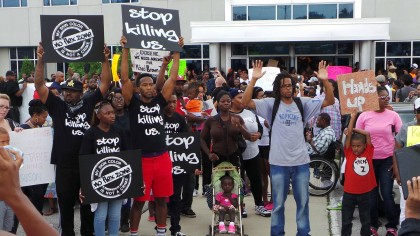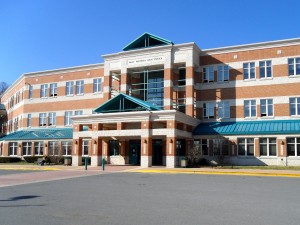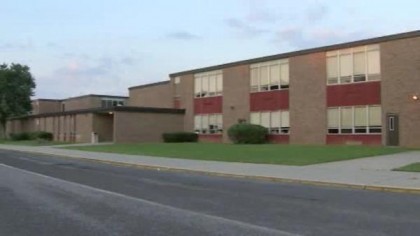
If you follow me on Twitter, then you know that I am very upset and borderline angry about the incidences of unarmed men being gunned down by the police. If you don’t know what I’m talking about, please Google the names “Mike Brown,” “Eric Garner” (died from an illegal chokehold), and “Ezell Ford.” I am very upset because I am all too familiar with how some police officers treat poor and black people.
Of course, we know the history in the U.S. of police brutality in poor and black communities. My first eye-opening experience happened in college. My then boyfriend was stopped by the police and harassed by them. He kept showing the officer his University of Maryland student ID, but they still treated him like a common criminal. My husband faced similar harassment from the police. We purchased a used car, and whenever he drove to northern Virginia for choir rehearsal, the police would always stop him because he and the car “fit the description.”
A week or two before these deaths, my 20-something sister, who is a mother and teacher, came to my house in tears. She could barely catch her breath because she was so upset. A local police officer stopped her for no reason and used excessive force and hostility when dealing with her. I promptly went to the police station and complained against the officer. His superior admitted my sister committed no crime and that the officer was out of line.
When I heard about the shooting death of Mike Brown, it was just a horrible reminder to me that when it comes to poor people of color, our lives simply don’t matter. This is a harsh statement, but how many times do we hear stories like these and then people give justification for the police using excessive force or for murdering someone. If you still don’t believe me, read all of the racist comments about the murder. People thanked the officer for taking another “animal” off the streets. That’s right. They called him an animal, less than human. This type of language was never used for the men who went on shooting sprees in California, Newtown, or in the movie theater in Aurora.
It also breaks my heart to hear people call Mike Brown a “thug.” Why? Because usually when someone says “thug,” they’re referring to a young, black, male wearing a baseball cap and dressed in urban clothes. They also used this description to describe Trayvon Martin. Yes, there are thugs, but that is not always the case. I remember when my 6’5 college boyfriend went to the Kennedy Center for a class project. We were dressed in casual clothes because we were students. A white couple moved their seats because they didn’t want to sit next to us. No one wanted to sit next to us. Probably because they thought he was a thug.
When my younger brother was a teenager, my stepmom used to warn him about how people would perceive him because he was over 6-feet tall and weighed about 225 pounds. She would always say, “People are going to be afraid of you because you’re big, black and a male.” She would warn him not to run in the mall because “they will shoot you.”
All of this makes me extremely upset and fearful for my own son. He’s black, and I’m pretty certain he’s going to be big. He’s been in the 90th percentile for height and weight since birth. I’m always afraid people will stereotype him as “menace to society” or as a “thug.” I’ve already seen how some parents respond to my son. When he was two, we went to the My Gym in Alexandria, Virginia. A white father moved his daughter away from my son. He wouldn’t let my son play with her—a two year old! It was a painful reminder of the discrimination he will face as a black male.
I am also upset because this incident with Mike Brown demonstrates how behavior that many teenagers engage in is criminalized with black teens. The media keeps stressing that Mike Brown had marijuana in his system at the time of his death. The first time I saw marijuana was in the dresser drawer of a white teenager at the University of Maryland. I’m pretty certain he was selling it out of the dorm. Some of the white students in the frat houses at Maryland even had cocaine—COCAINE! If the media got hold of these stories, I’m certain people wouldn’t call him an “animal” or a “thug.” All of this is just a painful reminder of how differing the American experience is for poor people of color, and I keep on stressing “poor” because class plays a major role as well.
Many white brothers and sisters simply don’t know what the fuss is all about. Some white evangelicals are trying to use this as an opportunity to build bridges, and that’s good. We need to have open and honest conversations about race, especially if we’re going to be the church or the Body of Christ.
All of this has made me want to present the following information to help you understand the experience of some poor black people in this country. I hope it will help you to understand how black people are criminalized and treated with hostility in certain neighborhoods. As a result, a culture of hostility is created.

My first two years of high school were spent at Walt Whitman High School in Bethesda, MD. If you’re not familiar with Bethesda, it is probably the richest city in Maryland. Most the students in the school are sons and daughters of diplomats. It is a wealthy neighborhood. My friend and I transferred there because the school had more opportunities than our local high school. We took three buses to get there.
Anyway, the students at Whitman had so much freedom. We could leave the campus during lunchtime. We could roam the halls in between classes. We could move freely without being harassed by teachers. There wasn’t a police presence in the school at all. There was only one security guard for the WHOLE school. Was there criminal behavior on campus? Yes! Students used to smoke weed in the bathrooms and in the parking lot.
I ultimately left Whitman because I couldn’t deal with the racism and classism from the other students. I couldn’t deal with their ignorant comments any longer. Also, while I was there, the teachers made ignorant comments. Some suggested that the black students couldn’t read. I couldn’t take it anymore.

After I left Whitman, I moved in with my father and stepmom in Willingboro, NJ. What a difference! The school was mostly black. We did not have freedom to move about the campus. Our movement was strictly controlled. There was a strong security presence on campus. We could not leave the building. Law enforcement was very involved with policing the students. Of course, the academic opportunities were not as great as those afforded to Whitman students. The black students at Willingboro were treated as thugs and menaces even though they did nothing wrong. We actually had to sign in to use the bathroom. A person sat outside of the bathroom with a sign-in sheet!
Now, you tell me. Do you think that these two groups of students are receiving the same opportunities or are being trained to behave and react in a similar fashion? I don’t think so! This is why many of us are angry because we know how in many cases, poor communities of color are strictly policed and negatively treated by those in authority including the police because they’re viewed as nothing more than “animals.”
However, as believers, we have a unique opportunity to build bridges and address the discrepancies in these communities. Jesus calls us to minister to the “least of these” and to reconcile with one another! He’s given us the power and ministry of reconciliation! It’s up to us to implement it.
What are your thoughts? These are controversial issues, but it’s time that we address some of them.
